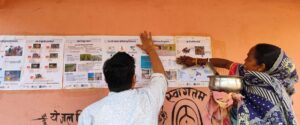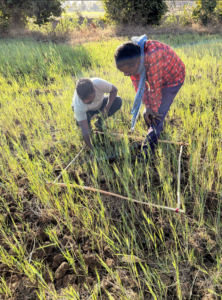The Green Transformation Pathways program seeks to address the looming phenomenon of uncertainties in agriculture, degradation of ecology, low returns, increasing rural distress; all compounded by climate changes and propose a solution in regenerative practices. The current ways of farming which are exploitative of land, soil and water resources, further exacerbate the factors triggering climate change. Therefore, to promote stronger rural economies based on sustainable resource use and safe agriculture everywhere, with EBRM we focused on strengthening its approach for India’s farming systems in the states of Madhya Pradesh and Jharkhand.
Above all the main objective is to facilitate its integration in regenerative agricultural practices and sustainable resource management. At the same time, EBRM offers opportunities for promoting livelihoods that stimulate the local economy. How do we see EBRM fitting into this?

Regenerative agriculture is all about increasing yields and healthier products, whilst ensuring the sustainable use of our natural resources. EBRM aims for just that and does so by providing alternative biological and ecological rodent management methods. These are a much-needed alternative to conventional chemical methods that cause harm to the environment and non-target species. EBRM is 100% chemical free, aims at prevention rather than killing and is based on robust knowledge of rat’s habitat and behaviour. By reducing rodent damage, we can increase yields and ensure higher quality and safety of crops by reducing rat-contamination.
In addition, different rat species have specific habitat preferences, they like stone bunds to take shelter, soft soils with high soil moisture to easily dig burrows and vegetative cover to hide for predators. Thus, a vibrant water catchment with healthy soils often means rats can also thrive. Therefore, it is important to figure out which rat habitat-functions we can control to reduce pest species to become abundant, while sustainable managing natural resources.
Lastly, there is ample opportunity to produce biological products which are  100% natural and have a 100% local value chain. Furthermore, there are opportunities for diverse people to innovate rodent-proof storage and provide EBRM services. Offering job opportunities for micro-enterprises, entrepreneurs and innovators; making rural economy lively again.
100% natural and have a 100% local value chain. Furthermore, there are opportunities for diverse people to innovate rodent-proof storage and provide EBRM services. Offering job opportunities for micro-enterprises, entrepreneurs and innovators; making rural economy lively again.








